Sandra Henriquez’s parents were immigrants from Ecuador with little to spare in their one-bedroom apartment, but they still found a way to share with their community. Whenever children from around their Los Angeles neighborhood needed help or a place to stay, her parents always took them in without second thoughts. When Henriquez’s father passed away years later, those same children – now adults – affectionately referred to themselves as her parents’ “strays.”
“Connectedness is a value that my parents raised me with,” says RALIANCE co-founder Henriquez. “It’s a value that makes me proud to be a Latina – we’re a community of people who always finds a way to support each other, whether it’s family, friends, or a neighbor. I’ve tried to live up to that value in my own life and work as well.”
We sat down with Henriquez this week to learn more about the Hispanic and Latinx communities – and the challenges they face to change a society that doesn’t always support their needs, particularly as it relates to sexual harassment, misconduct and abuse.
RALIANCE: Language barriers are often cited as one of the biggest challenges facing the Spanish-speaking community in America. Can you explain why this is such a significant problem?
Henriquez: Spanish speakers need and deserve resources at the same time and of the same quality as those given to English speakers, but that’s rarely the case. Creating resources for Spanish speakers that are linguistically and culturally appropriate is always an afterthought, which means the Hispanic and Latinx communities often receive delayed or incomplete information, setting them at a real disadvantage.
For example, if an employer creates a new policy about workplace misconduct, Spanish speakers may be the last to know about the new rules or the resources available to them, leaving them vulnerable.
But this conversation isn’t just about language itself – it’s also about the mode of communication. In addition to translation, we also have to think about the way a message is conveyed. Many members of the Hispanic and Latinx communities may need materials that best meet their reading level, or verbal communications in their preferred language to make sure they receive the message.
RALIANCE: How have you tried to counteract the challenge of the language barrier in your own work?
Henriquez: I always insist that Spanish-language resources be given the same priority as English-language resources. If RALIANCE or the organizations we work with have an English-language resource for survivors and community members ready to release, I’ll advise holding it until we also have a high-quality version of a Spanish version as well – this way everyone has the right information at the same time. It’s fundamentally about making sure everyone feels seen and valued. Organizations and companies so often fail to see and value their people. The best organizations ensure that their people know they matter and that they can bring their whole selves to work, no matter their linguistic needs.
RALIANCE: What positive changes have you seen for the Latinx and Hispanic communities?
Henriquez: Every bit of real progress I’ve seen in recent years has come from the grassroots level, with members of the community connecting to each other and taking action. A great example of this can be seen in the work of Ya Basta Center, one of the organizations that received a grant from RALIANCE with the help of the National Football League.
The organization has fundamentally changed the janitorial industry in California. Hispanic and Latinx janitors have historically been incredibly vulnerable to abuse. They knew they needed to lead the way to make change and they protested and put pressure on state legislators until a new law was signed by the governor that would provide greater protections for janitors. This included a requirement that employers put all employees through harassment training that would be conducted by the janitors themselves.
There were people who said that janitors couldn’t conduct their own harassment training – but they knew best what they needed, and they demanded they be given the opportunity to see their needs were met. To me, that’s very powerful, to claim the right to create change for your community.
RALIANCE: As an immigrant, what would you say to Latinas immigrating to the United States today? What do they need to know?
Henriquez: This all goes right back to the community my parents helped to create for our family and other kids in our neighborhood – if you come to a new place like the U.S., get yourself connected to a community as quickly as possible. Whether that community is extended family or a faith group or parent group, that connectedness can help you to understand and know your rights. I know a family who came to the States recently, and when they ran into a sexual harassment issue at work, someone connected them to me. I was proud to be able to help them, but even prouder of the connections that brought them to me. Those connections are the foundation for change.
RALIANCE provides consulting, assessment, and employee development services to help build more equitable workplace cultures and create environments free from sexual harassment, misconduct and abuse. We stand ready to support your organization’s goals – contact us today at info@raliance.org to get started.

